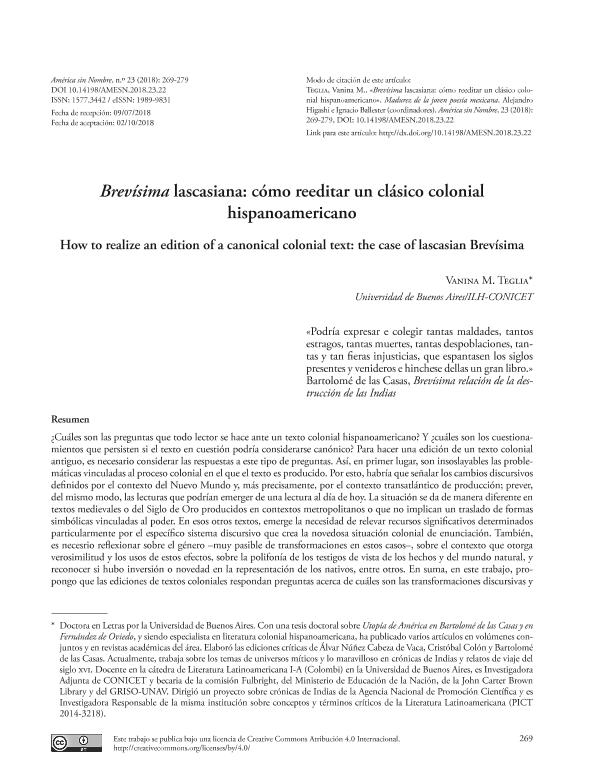Mostrar el registro sencillo del ítem
dc.contributor.author
Teglia, Vanina María

dc.date.available
2019-10-17T14:55:05Z
dc.date.issued
2018-12
dc.identifier.citation
Teglia, Vanina María; Brevísima lascasiana: cómo reeditar un clásico colonial hispanoamericano; Universidad de Alicante. Centro de Estudios Literarios Iberoamericanos Mario Benedetti; América sin nombre; 23; 12-2018; 269-279
dc.identifier.issn
1577-3442
dc.identifier.uri
http://hdl.handle.net/11336/86150
dc.description.abstract
¿Cuáles son las preguntas que todo lector se hace ante un texto colonial hispanoamericano? Y ¿cuáles son los cuestionamientos que persisten si el texto en cuestión podría considerarse canónico? Para hacer una edición de un texto colonial antiguo, es necesario considerar las respuestas a este tipo de preguntas. Así, en primer lugar, son insoslayables las problemáticas vinculadas al proceso colonial en el que el texto es producido. Por esto, habría que señalar los cambios discursivos definidos por el contexto del Nuevo Mundo y, más precisamente, por el contexto transatlántico de producción; prever, del mismo modo, las lecturas que podrían emerger de una lectura al día de hoy. La situación se da de manera diferente en textos medievales o del Siglo de Oro producidos en contextos metropolitanos o que no implican un traslado de formas simbólicas vinculadas al poder. En esos otros textos, emerge la necesidad de relevar recursos significativos determinados particularmente por el específico sistema discursivo que crea la novedosa situación colonial de enunciación. También, es necesario reflexionar sobre el género ?muy pasible de transformaciones en estos casos?, sobre el contexto que otorga verosimilitud y los usos de estos efectos, sobre la polifonía de los testigos de vista de los hechos y del mundo natural, y reconocer si hubo inversión o novedad en la representación de los nativos, entre otros. En suma, en este trabajo, propongo que las ediciones de textos coloniales respondan preguntas acerca de cuáles son las transformaciones discursivas y los posicionamientos del texto respecto de un corpus colonial ?entendido en sentido amplio? y del proceso de conquista y colonización. | What questions do all readers ask themselves before a Spanish-American colonial text? And what questions persist if said text is also considered canonical? To realize an edition of an old colonial text, it is necessary to consider the answers to such questions. One must take into account the difference between Spanish-American colonial texts and texts from the medieval period or the Spanish Golden Age produced in metropolitan contexts or that do not imply a transfer or imposition of exogenous symbolic forms linked to power. Unlike with the latter, the edition of a colonial text should involve surveying significant resources determined by the specific discursive system that creates the novel colonial situation of enunciation. That is to say, the problems linked to the colonial process through which the text is produced are unavoidable. Therefore, firstly, we should point out the discursive changes caused by the context of the New World and, more precisely, by the transatlantic context of production; it is also necessary to foresee, in the same way, the readings that could emerge today. Moreover, it would be necessary to reflect on gender?quite likely on transformations in these cases?; on context and its granting of verisimilitude and the uses of these effects; on the polyphony of witnesses in view of events and the natural world. It is also important to consider if there was an investment or novelty in the representation of natives, among others. In short, in this article, I propose that editions of colonial texts answer questions about the discursive transformations and positioning of the text regarding a broad colonial corpus and the process of conquest and colonization.
dc.description.abstract
What questions do all readers ask themselves before a Spanish-American colonial text? And what questions persist if said text is also considered canonical? To realize an edition of an old colonial text, it is necessary to consider the answers to such questions. One must take into account the difference between Spanish-American colonial texts and texts from the medieval period or the Spanish Golden Age produced in metropolitan contexts or that do not imply a transfer or imposition of exogenous symbolic forms linked to power. Unlike with the latter, the edition of a colonial text should involve surveying significant resources determined by the specific discursive system that creates the novel colonial situation of enunciation. That is to say, the problems linked to the colonial process through which the text is produced are unavoidable. Therefore, firstly, we should point out the discursive changes caused by the context of the New World and, more precisely, by the transatlantic context of production; it is also necessary to foresee, in the same way, the readings that could emerge today. Moreover, it would be necessary to reflect on gender—quite likely on transformations in these cases—; on context and its granting of verisimilitude and the uses of these effects; on the polyphony of witnesses in view of events and the natural world. It is also important to consider if there was an investment or novelty in the representation of natives, among others. In short, in this article, I propose that editions of colonial texts answer questions about the discursive transformations and positioning of the text regarding a broad colonial corpus and the process of conquest and colonization.
dc.format
application/pdf
dc.language.iso
spa
dc.publisher
Universidad de Alicante. Centro de Estudios Literarios Iberoamericanos Mario Benedetti
dc.rights
info:eu-repo/semantics/openAccess
dc.rights.uri
https://creativecommons.org/licenses/by-nc-sa/2.5/ar/
dc.subject
LITERATURA COLONIAL
dc.subject
LITERATURA LATINOAMERICANA
dc.subject
EDICIONES CRÍTICAS
dc.subject
BARTOLOMÉ DE LAS CASAS
dc.subject.classification
Literaturas Específicas

dc.subject.classification
Lengua y Literatura

dc.subject.classification
HUMANIDADES

dc.title
Brevísima lascasiana: cómo reeditar un clásico colonial hispanoamericano
dc.title
How to realize an edition of a canonical colonial text: the case of lascasian revísima
dc.type
info:eu-repo/semantics/article
dc.type
info:ar-repo/semantics/artículo
dc.type
info:eu-repo/semantics/publishedVersion
dc.date.updated
2019-10-11T13:47:45Z
dc.identifier.eissn
1989-9831
dc.journal.number
23
dc.journal.pagination
269-279
dc.journal.pais
España

dc.journal.ciudad
Ailcante
dc.description.fil
Fil: Teglia, Vanina María. Consejo Nacional de Investigaciones Científicas y Técnicas; Argentina. Universidad de Buenos Aires. Facultad de Filosofía y Letras. Instituto de Literatura Hispanoamericana; Argentina
dc.journal.title
América sin nombre
dc.relation.alternativeid
info:eu-repo/semantics/altIdentifier/url/https://americasinnombre.ua.es/article/view/2018-n23-brevisima-lascasiana-como-reeditar-un-clasico-colonial-hispanoamericano
dc.relation.alternativeid
info:eu-repo/semantics/altIdentifier/doi/http://dx.doi.org/10.14198/AMESN.2018.23.22
Archivos asociados
